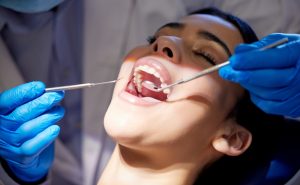Your baby has been crying more lately, and is a bit fussy. As a parent, you notice these things. What could be happening? Aside from the tears, less sleep, and slight irritability, your baby seems fine.
It could be teething. Our pediatric dental staff answers frequently asked questions about teething in today’s blog.
Related Post: Tips for Keeping Your Baby’s Gums Healthy from Dr. Scott
How do I know my baby is teething?
Watch for common symptoms of teething, including excessive drooling, irritability, crying, chewing, appetite loss, and problems sleeping.
Your baby may produce more saliva when teething because it’s their body’s way of trying to soothe tender gums.
Of course, if there is a little bit of pain associated with a tooth coming in, your baby will be a bit fussy and irritable. This is completely normal.
Excessive chewing comes from your baby’s need to try to lessen the pain of the new tooth coming in. Much like you put pressure on your finger to alleviate the pain of a nail cut too short or a paper cut, your baby will want to bite on things (like your finger) to make the pain go away.
Suction may be problematic with teething, so your baby may not breastfeed or drink from a bottle as readily as before.
Because of the pain, your young one may not sleep as much and might cry out in the night more than before.
If you think your child has a tooth coming in, check for swollen gums and a slight fever. Swollen gums look pink and feel slightly firm. A low-grade fever of around 99 to 100 degrees may accompany a new tooth.
When does teething begin?
On average at six months old. All babies are unique, so teething may start as early as four months old or as late as 12 months.
Why is teething pain worse at night?
Babies are winding down and trying to sleep, so they’re not playing, smiling, cooing, or eating. This makes them more aware of their pain, so they may cry more at night. Exhausted from a long day, they have less energy to handle their pain. Then they do what feels natural by crying it out.
What can I do to soothe my baby’s teething pain?
Chew toys are one way to help your baby alleviate pain. Make sure to keep them as clean as you can. You do need to watch out for teething toys that have liquid in them or with small parts. Consider looking for just a plain plastic teething ring.
Another way is by gently rubbing their gums with your finger or wet gauze. A cool (not frozen) spoon or a chilled teething ring will also work because colder temperatures lessen the swelling.
Over-the-counter pediatric pain medications offer another avenue of pain relief. Please follow the label instructions.
Chilled (not frozen) breast milk might also work if you’ve been breastfeeding your baby. Cool breast milk serves a dual purpose of calming the pain and providing nutrition at the same time.
Avoid topical anesthetics you rub on your baby’s gums, even ones designed for kids, since they provide only temporary pain relief with benzocaine or lidocaine. Homeopathic teething medications are not recommended either because they lack scientific evidence for how they work.
How long does teething last?
Although not constant, the second molars appear at around 25 to 33 months. What worked to soothe your baby before might not work for a toddler because these teeth are bigger and cause more swelling. You might need to find other comfort methods by the time your baby grows into an active, walking toddler.
Related Post: Pediatric Dentistry Advice: When to Start Brushing Baby Teeth
When should I take my baby to a doctor or pediatric dentist for teething?
Contact your doctor or dentist if teething interferes with feeding, a fever goes above 100 degrees, you see blue or dark red colors around the area where the tooth is coming in, or your baby’s pain doesn’t seem to get relief.
Feel free to reach out to us anytime during office hours by calling (417) 887-1120. We’re happy to assist with your baby’s teething.





